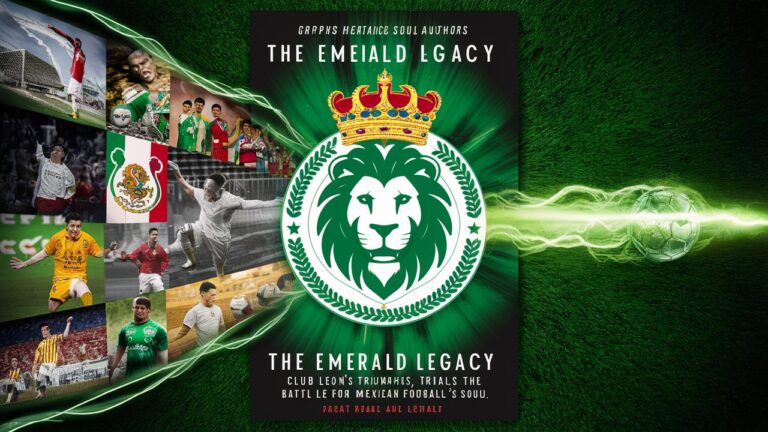Introduction: More Than Green and White Stripes
Club León, affectionately known as “La Fiera” (The Wild Beast) or “Los Panzas Verdes” (The Green Bellies), isn’t just a football club—it’s an institution woven into Mexico’s cultural fabric. Founded in 1944 after the merger of Unión de Curtidores and Selección de Guanajuato, León rapidly ascended from regional hopeful to national powerhouse, capturing eight Liga MX titles and etching legends like Adalberto “Dumbo” López (136 goals) into history 310. Yet today, the club stands at a crossroads, embroiled in a battle against FIFA regulations, multi-club ownership conflicts, and systemic challenges in Mexican football. This article explores León’s glorious past, its present turmoil, and what its struggles reveal about the sport’s future in Mexico.
The Golden Age: Foundations of a Football Dynasty
The late 1940s–1950s marked León’s undisputed golden era. Under visionary leadership and fueled by López’s lethal scoring, the club clinched five league titles in ten years (1948, 1949, 1952, 1956), becoming Mexico’s first “Campeonísimo” in 1949 after winning both the league and cup double 10. The iconic 1948 title—secured via a playoff win against El Oro—showcased tactical ingenuity, with teenager Jaime Moncada stepping up when López was injured. This period wasn’t just about silverware; it established León’s identity: attacking verve, resilience, and deep community roots. Their home, Estadio La Martinica (later replaced by Estadio León), became a fortress where underdogs transformed into giants. Even legends like goalkeeper Antonio “La Tota” Carbajal, a five-time World Cup participant, defined their careers here 310.
Turbulence and Resilience: Relegations and Phoenix-like Returns
León’s journey hasn’t been linear. The club suffered crushing relegations in *1987* and *2002*, each exposing financial instability and mismanagement. The 1987 demotion—triggered by a last-day collapse against Puebla—plunged the team into second-division obscurity for three seasons 10. A brief resurgence followed in the 1990s, including a 1992 league title, but the 2002 relegation was even more devastating. Under owner Roberto Zermeño, constant squad upheaval and strategic drift culminated in a last-place finish. Salvation arrived in 2010 when Grupo Pachuca purchased the club, investing in infrastructure and appointing coach Gustavo Matosas. His aggressive, possession-based style propelled León back to Liga MX in 2012. By 2013–2014, they achieved “bicampeonato”—consecutive Apertura and Clausura titles—echoing their 1940s dominance 310.
The Multi-Club Ownership Crisis: León vs. FIFA and the System
In 2023, León won the CONCACAF Champions League, securing a spot in FIFA’s expanded 2025 Club World Cup (CWC). Yet in May 2025, the Court of Arbitration for Sport (CAS) upheld FIFA’s decision to expel León from the tournament. The reason? Article 10 of CWC regulations bars multiple clubs under the same ownership from competing. Since both León and Pachuca (2024 CONCACAF champions) are owned by Grupo Pachuca, FIFA disqualified León—despite their earlier qualification 115.
This ruling ignited fury. León’s president lambasted Liga MX and the Mexican Football Federation (FMF) for offering “no support,” accusing FIFA of favoring “commercial interests” (a nod to Inter Miami’s controversial inclusion without continental silverware) 815. The decision also exposed Liga MX’s deeper crisis: 40% of its clubs (including León) share owners. Grupo Orlegi (Atlas/Santos), TV Azteca (Mazatlán/Puebla), and Grupo Caliente (Tijuana/Querétaro) control multiple teams, often prioritizing profit over sporting merit. Unsurprisingly, six of eight multi-club-owned teams languished at the Liga MX 2025 Clausura’s bottom 1.
Grupo Pachuca’s Dilemma: Football Integrity vs. Financial Realities
Grupo Pachuca proposed creating a “blind trust” for León to comply with FIFA—a solution UEFA accepts. FIFA rejected this, insisting ownership must be fully divested. Though Grupo Pachuca offered to sell León, no deal materialized before the CWC deadline 15. This impasse underscores Mexican football’s governance flaws. Owners wield disproportionate league influence, blocking reforms like promotion/relegation (suspended until 2026) or ownership caps. Fines for underperformance—e.g., Grupo Salinas paid 240 million pesos since 2020—are treated as operating costs, not incentives for competitiveness 1.
Looking Ahead: América, Leagues Cup, and León’s Path Forward
León’s CWC spot will be decided by a playoff between LAFC and Club América 15. Domestically, León remains competitive (6th in Clausura 2025), but its July 29 Leagues Cup match against Montréal Impact looms large. Montréal’s form is dire (1 win in 20 matches), contrasting with León’s 65% “over 2.5 goals” rate 714. Beyond the pitch, León’s saga has intensified calls to ban multi-club ownership. LaLiga president Javier Tebas labeled it an “embarrassment,” urging Liga MX to emulate Europe’s stricter governance. Whether Mexico’s power brokers heed this—or preserve their lucrative fiefdoms—remains uncertain 1.
Conclusion: A Microcosm of Mexican Football’s Crossroads
Club León embodies Mexican football’s soul: historic triumphs, visceral fan passion, and chaotic adversity. Its FIFA expulsion isn’t just a sporting setback; it’s a symptom of systemic rot. As Liga MX stagnates—with MLS eclipsing its CONCACAF dominance—León’s fight highlights urgent needs: transparent governance, sporting meritocracy, and divorcing club fates from conglomerate whims. The Emeralds’ legacy deserves more than boardroom battles. It demands a future where “La Fiera” roars on the global stage, not in courtrooms.
Frequently Asked Questions (FAQs)
1. Why was Club León excluded from the 2025 Club World Cup?
León and Pachuca share ownership (Grupo Pachuca), violating FIFA’s Article 10 prohibiting multi-club ownership in tournaments. Despite appeals, CAS upheld León’s expulsion in May 2025 115.
2. Why was Pachuca prioritized over León despite León qualifying first?
FIFA’s ruling didn’t specify, but Pachuca’s 2024 CONCACAF Champions League win likely made them the “active” qualifier. León’s later disqualification created the vacancy 115.
3. What is Grupo Pachuca’s stance on ownership compliance?
They offered to sell León or place it in a trust (a UEFA-accepted solution). FIFA rejected the trust, and no sale occurred pre-tournament 15.
4. How does multi-club ownership affect Liga MX’s competitiveness?
Six of eight Liga MX clubs under shared ownership finished in the 2025 Clausura’s bottom half. Critics argue owners prioritize profits over sporting success, stifling investment 1.
5. What’s next for Club León?
They’ll compete in Liga MX and the Leagues Cup (facing Montréal Impact on July 29). Long-term, their role in forcing ownership reforms could reshape Mexican football 714.
